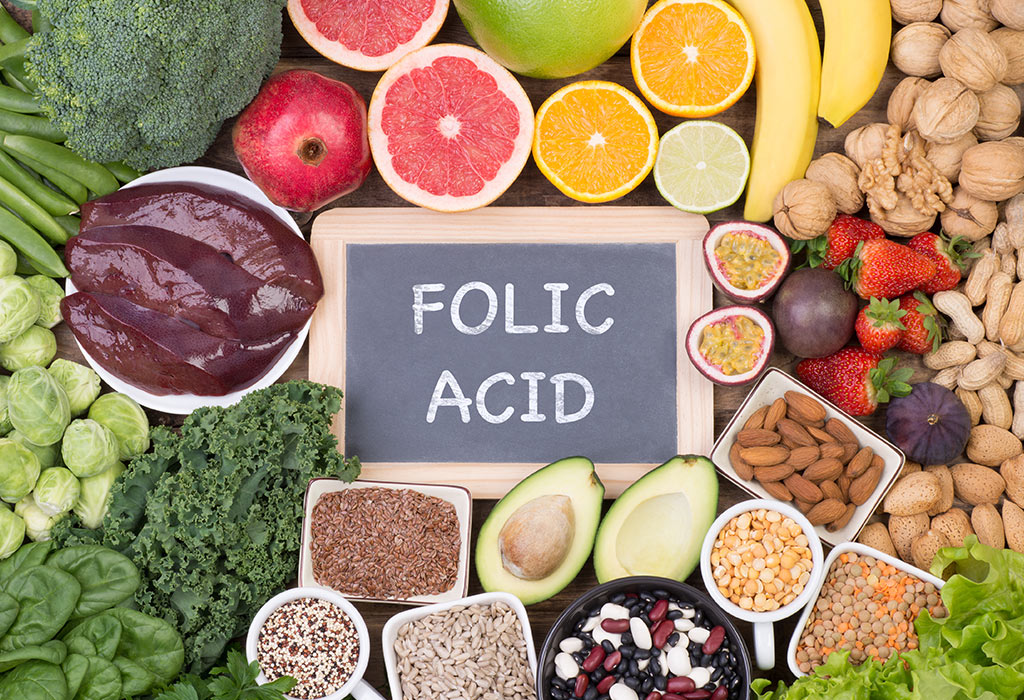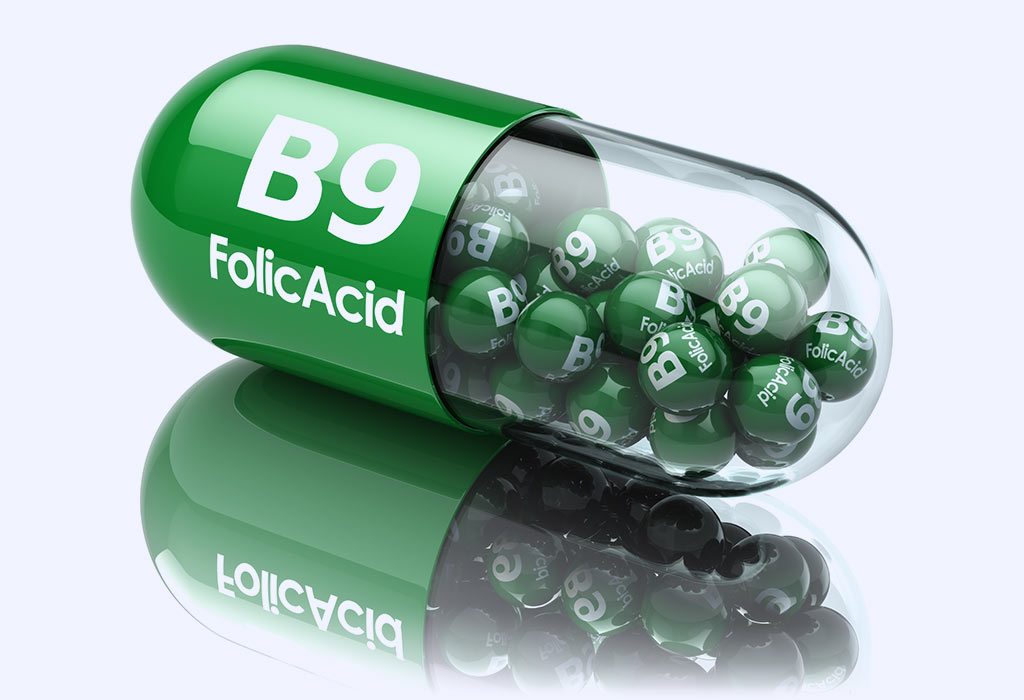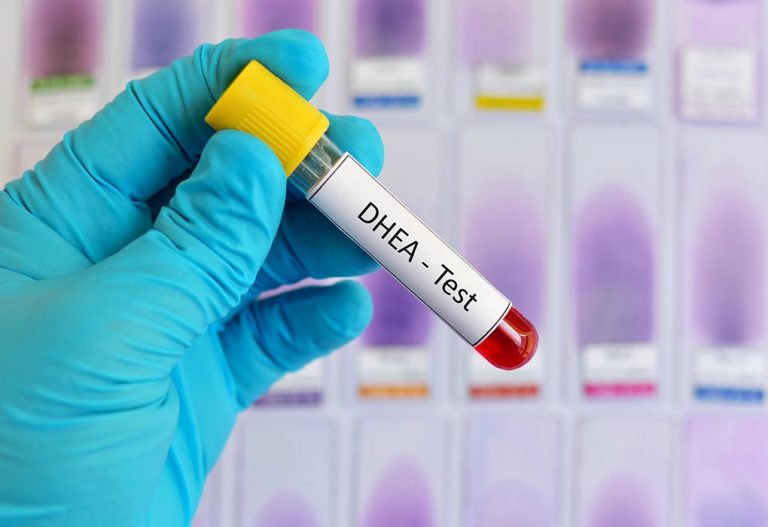Folic Acid for Fertility and Trying to Conceive – Benefits and Food Sources
Proper nutrition is key to a healthy pregnancy. Hence, if you are looking to conceive, it is vital that you take the required supplements to ensure that your body is in the best condition.
One of the substances generally recommended for women trying to conceive is folic acid. It aids in the production of red blood cells as well as DNA. While it is known that are a lot of benefits that come with ingesting folic acid for pregnant women, it is equally beneficial for women trying to get pregnant and for men as well. Read on to learn more about folic acid for fertility.
What Is Folic Acid?
A synthetic form of vitamin B9, folic acid is one of the water-soluble vitamins that aid the fundamental action of cell metabolism. It is one of the eight vitamins that are soluble in water and in its natural form, vitamin B9 is called folate (1). They are found in many foods that are eaten commonly including spinach, pumpkin, oysters, carrots, okra, asparagus, liver and broccoli. There are a lot of other foods that provide the same, including poultry, rice, beans, eggs, nuts, meat and dairy products.
If needed, folic acid can be added to other foods so as to increase their vitamin content. It can be found in nutritional supplements as well if needed and they’re found in bread, pasta, cereals, rice and a lot of other grain-based foods.
How Does Folic Acid Help Increase Fertility?
Folic acid is known to be great for fertility. Here are some ways it can enhance fertility.
Male Fertility
Folic acid plays a role in helping male fertility and increasing the chances of helping the sperm fertilize the egg. Here are some other ways in which it is useful (2):
- Higher sperm count: : Folic acid increases sperm count and this can help men gain the necessary supplements in order to help their partners get pregnant. While women need to generally time their cycle correctly and know when they’re ovulating, sometimes; the problems could be with their man. When a man’s sperm count is low, there won’t be enough sperm to travel and fertilize the egg because the pathway is long. This pathway runs via the fallopian tubes from the cervix to the egg and the sperm generally traverses this path. If pregnancy occurs when the man takes 700 mcg of folic acid, then it can be attributed to the folic acid.
- Lesser risk of sperm abnormalities : When men consume folic acid, it doesn’t only help with their sperm count but actually helps in reducing their 20 to 30%. This reduces the risk of chromosomal abnormalities which can end up leading to birth defects such as Down Syndrome.While it was believed that babies were born with chromosomal disorders due to egg defects, it has come to light that sperm abnormalities can cause issues as well. Folic acid consumption on a regular basis can help in bringing down these problems and improving fertility in men.
- Boosts fertility when taken with other supplements : The best way to make folic acid work for men is to have it with other male fertility supplements such as Vitamin C and zinc. These can help increase sperm count and improve the quality of the sperm as well. When mixed with folic acid, they can help increase the overall motility and usefulness of the sperm. Folic acid boosts fertility in men by around 74% in a study conducted by a Netherlands-based medical University (3).
Female Fertility
Folic acid is crucial in enabling women to increase their chances of pregnancy by improving the fertility conditions in their bodies. Here are some of the ways in which folic acid is beneficial for women:
- Working with other vitamins : By working with other vitamins and minerals, folic acid helps women to get pregnant faster by improving conditions for sperm fertilization. There are a lot of other vitamins that aid in the process and folic acid is not the only one required. Women are generally advised to have a folic acid supplement along with a prenatal vitamin that usually has about 400 mcg of the nutrients. A bit of extra folic acid is always recommended along with vitamin C, vitamin B6, zinc, iron and niacin amongst others to help get pregnant.
- Increase the egg quality : Similar to how folic acid improves the quality of sperm in men, it also aids in improving the egg quality in women. If women begin having folic acid to conceive a few months before they attempt conceiving, then the chance of a baby born with a chromosomal/birth defect reduces greatly. The folic acid will help in keeping the egg healthy and away from any disease-causing agents.
- Improve the quality of the cervical mucus : Consistency in the cervical mucus is very important when it comes to helping women conceive. A lot of women chart their cycles by checking the texture and colour of the cervical mucus but when the ovulation is near, it is important to note that there is a substantial amount of the mucus. This mucus helps the sperm travel and meet the egg.
- Prevent anaemia : Women who suffer from even the slightest bouts of anaemia can find it hard to ovulate because the lack of iron can disturb the balance of the hormones. 400 mcg of folic acid is added to other mineral supplements at least 3 months before conceiving is advisable. Iron helps in regulating hormonal regulation and due to this, ovulation will return to expected levels. Folic acid deficiency itself causes folate deficiency anaemia, and it can be avoided through proper medication.
When to Take Folic Acid to Get Pregnant?
To increase your chances of getting pregnant, start taking folic acid daily at least one month before conception and continue through the first trimester, as it helps prevent neural tube defects and supports healthy fetal development; the best time to take it is in the morning with water or as directed by your doctor, ensuring consistent absorption. Folic acid and getting pregnant are closely linked, as folic acid helps prevent birth defects. If you have a history of neural tube defects or certain health conditions, your doctor may recommend a higher dose (4).
Recommended Intake of Folic Acid for Men and Women
The intake levels of folic acid for men and women can be segregated as follows:
- For women 14 years and above, as well as for men, 400 mcg is recommended
- For breastfeeding women, 500 mcg
- For pregnant women, 600 mcg
Enriched bread and cereals are the best way to get your dose of folate and folic acid. Most of the foods are added with extra folic acid, so regular consumption of these should improve fertility levels.
Foods Rich in Folic Acid
Here are a few foods that have rich content of folic acid in them. You can consume them regularly to help your body gain the necessary nourishment (5):
| Food | Amount |
| Beef liver | 215 mcg |
| Spinach | 131 mcg |
| Asparagus | 89 mcg |
| Black-eyed peas | 105 mcg |
| White rice | 90 mcg |
| Romaine lettuce | 64 mcg |
| Brussels sprouts | 78 mcg |
| Avocado | 59 mcg |
| Broccoli | 52 mcg |
| Spinach | 58 mcg |
Source: https://www.verywellfamily.com/folic-acid-for-female-and-male-fertility-1959878
Is It Safe for Women to Take Folic Acid Supplements?
Folic acid is an important requirement for women and despite it being added to bread and cereals, a lot of women don’t get enough of it. Women who are looking to get pregnant are recommended a daily dose of 400 mcg of folic acid. During pregnancy, around 600 mcg is advised.
A lot of doctors will recommend prenatal vitamins to help women conceive or just a multivitamin to be had daily. As long as the multivitamin includes 400 mcg of folic acid, it is good to go. Folic acid is also a water-soluble vitamin so it needs to be replaced on a daily basis (6).
What Are the Risks of Taking High Doses of Folic Acid?
There are risks involved when you end up having too much folic acid as well and it is important that you only have the dosage recommended by your doctor. The daily intake of folic acid should not exceed more than 1000 mcg. Large doses may mask vitamin B-12 deficiency. However, it is wise that B-12 levels be tested before going ahead and including extra supplements.
Also, high doses can harm the DNA synthesis inside the sperm and it can also interact with other medications. Folic acid can reduce the effectiveness of phenytoin, which is an anti-seizure drug.
FAQs
1. Should I take folic acid even if I eat folate-rich foods?
Yes! Even with a diet high in folate (spinach, lentils, avocados), synthetic folic acid is better absorbed, ensuring you meet the increased needs for pregnancy.
2. Can folic acid reduce the risk of miscarriage?
Research is mixed, but adequate folic acid may lower risks of certain pregnancy complications linked to neural tube defects, though it doesn’t prevent all causes of miscarriage.
This was all about folic acid and fertility. We hope we have answered your question – does folic acid help you get pregnant? Thus, folic acid can play a big role in ensuring that both men and women are able to increase their fertility levels. While they are found in most common foods, an extra dosage of folic acid on a regular basis can help in conceiving. It is recommended that you visit a doctor before going ahead with any extra dosage, as too much of it can cause issues as well.
References/Resources:
1. National Library of Medicine – Folic Acid
4. Nemours Kids Health – Folic Acid and Pregnancy
5. Harvard T.H. Chan – Folate (Folic Acid) – Vitamin B9
6. NHS – How and when to take folic acid
Also Read:
Best Herbs to Boost Fertility
Fertility Treatment Options for Men and Women
Home Remedies to Increase Fertility in Men and Women
Was This Article Helpful?
Parenting is a huge responsibility, for you as a caregiver, but also for us as a parenting content platform. We understand that and take our responsibility of creating credible content seriously. FirstCry Parenting articles are written and published only after extensive research using factually sound references to deliver quality content that is accurate, validated by experts, and completely reliable. To understand how we go about creating content that is credible, read our editorial policy here.





































